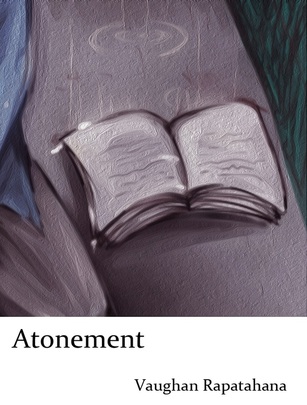
by Vaughan Rapatahana
I pride myself on an extensive (and inventive) vocabulary, but I did end up with a list of words to check up on after reading Vaughan Rapatahana’s collection of poems, Atonement: fuliginous, mephitic, spathe, spadix, adumbral, aporia, flocculent, aleatory, duende…
And me a 100 percenter on the Reader’s Digest Word Power challenges!
Rapatahana uses these words at risk of dying as if he keeps them in a shaker on his desk to season every poem, every page. Sometimes it works; sometimes not. The unfamiliar can be a stumble-stone, a shut door rather than an invitation.
Another mannerism of his is to play around with how the words are laid down on the page – double spacing of characters, up and down verticals of lines, slants and displacements. Again, sometimes I got this straight away and it was added value, and now and then it was a visual irritant.
Readability is not only in choice of words and style of expression, it is also in how the text is set out.
Don’t get me wrong; this is a personal opinion only, and in spite of such momentary distractions, I still enjoyed most of the poems for their vivacity and vitality – and the compelling veracity that Rapatahana brings to his work.
I also liked his underlying sense of fun – that he seems to relish the act of writing a poem as the chance to create definitions for what is observed and imagined; definitions often at odds with what a majority might regard as societal norms.
When he is descriptive he takes you with him – as in kwai shing:
a sardine tin
of hard-bitten turrets
warped
into
submission
a laminate
still-life,
a monochrome whisper:
van gogh
stayed
well away from
I liked Vaughan Rapatahana’s casual sprinkle of Māori and Chinese phrases. I liked the sense he gives of tussling with his thoughts, his observations.
Though I found something of interest in all, the poems that fully engaged me were it’s 3 a.m. in papatoetoe, betrayal, a forced reunion – resonant with tragedy; he urupa mate, eye love and so winter, with
its ramshackle
rattle of
scatterbrain rain
&
misanthropic mist
I liked also how the poems are occasionally interrupted and energised by the excellent artwork of Pauline Canlas Wu, his daughter.
And I suspect as I re-read Rapatahana again (and he frequently pops up in literary journals these days) I will come to understand more fully his quest for something new and earnest. Something we’d all be better to go looking for ourselves.
Author: Vaughan Rapatahana
Publisher: ASM/Flying Islands (Macao) and MCCM Creations (Hong Kong)
ISBN: 978-988-13115-1-1
Available: Hard copy book from www.amazon.com or from MCCM Creations (Hong Kong)

 RSS Feed
RSS Feed
